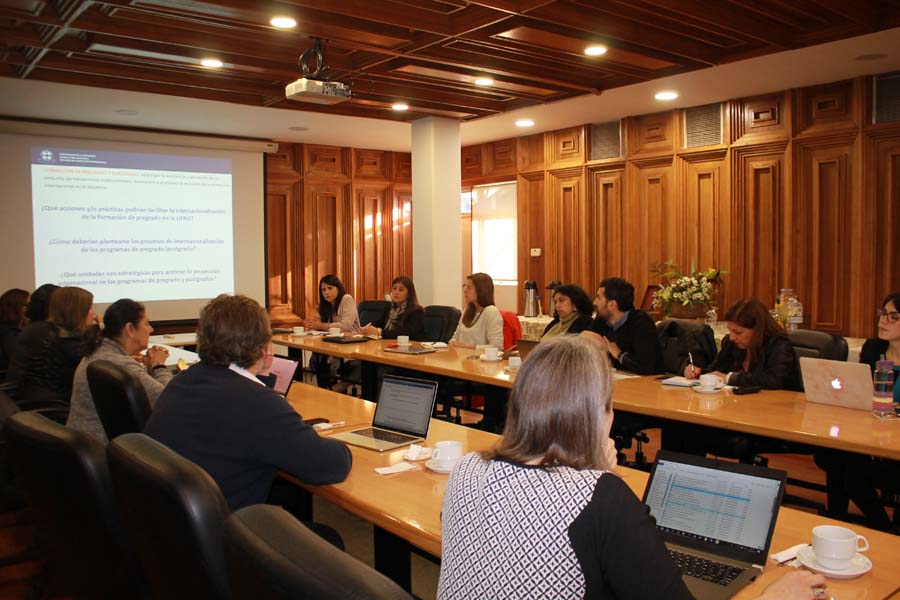|
The Internationalization Committee of the Universidad de La Frontera had its second meeting in order to continue conversations about the main aspects and challenges the internationalization process implies. The meeting was directed by the International Affairs Office, and different academics and professionals were invited to participate. |
The Internationalization Policy of the Universidad de La Frontera contemplates three chapters. It is a basic document that defines the main actions regarding the promotion, strengthening and expansion of international links, in benefit of the university management and the development of its strategic programs, its academics, researchers and students. The Internationalization Committee of the Universidad de La Frontera had its second meeting in order to continue conversations about the main aspects and challenges the internationalization process implies. The meeting was directed by the International Affairs Office, and different academics and professionals were invited to participate. Dr. Berta Schnettler is the director of the committee, which is composed of Dr. Ricardo Herrera, Silvana Pineda, Franklin Valdebenito and Janina Hanswillemenke, and the invited academics and professionals were Dr. María de la Luz Mora, Dr. Marianela Denegri, Dr. Renato Hunter, Solange Martínez, Dr. Enrique Hinostroza, Dr. Pamela Leal, Juan Méndez, Ieva Zebryte, Julia Hasbún, Natalia Caniguán, Antonia Espinoza and Consuelo Sánchez. During the meeting, the participants reviewed some main issues of the Internationalization Policy, collected different opinions and discussed different topics. “These meetings have the purpose of generating a fruitful dialogue that allows to focus on the experiences of the faculties and some of the doctoral programs which have already defined their programs regarding their actions and objectives,” Dr. Schnettler said. Besides, the idea is to think of internationalization as a dynamic, continuous and comprehensive process that involves the university community, with the purpose of contributing to the international and intercultural dimension, in order to increase the institutional capabilities. “There are different aspects we have to work on,” Dr. Marianela Denegri, the director of the Scientific Social Science Nucleus and the Center of Excellence in Consumption and Economic Psychology, said. “I think that one of the essential aspects is the cooperation between graduate programs, through co-tutelage and dual degrees. And we have to intensify the south-south cooperation, which is a challenge we could benefit from in the future. There are a lot of renowned institutions in Latin America and Asia. It’s a great opportunity to establish mutual cooperation for middle-income countries like ours.” POSITIVE EXPERIENCE One of the academic macro units with high productivity in this field is the Faculty of Law and Business. Ieva Zybrite, their director of Outreach and Community Engagement, explained that their internationalization program is in force since 2016. “We suggested certain objectives, targets and monitoring activities, which we reviewed together with our students, employees and academics. That gives us some guidance in our actions and facilitates administrative processes.” This program has three key axes: internationalization at home, short-term undergraduate and graduate courses (professional updating), and the south-south cooperation. “Thus we have identified which are the partner institutions. We are cooperating with the University of Sao Paulo in Brazil, the University ORT Uruguay, with universities of the Pacific Alliance, and, through an entrepreneurship system, we are learning about the Māori Community in New Zealand,” she added. The next meetings of the Internationalization Committee of the Universidad de La Frontera will also take place with representatives of the university community, especially of the faculties, nuclei and doctoral programs, among others, in order to keep working on the accomplishment of the institutional objectives with joint efforts.  Written by: UFRO Communications Office Written by: UFRO Communications OfficeThis email address is being protected from spambots. You need JavaScript enabled to view it. |





